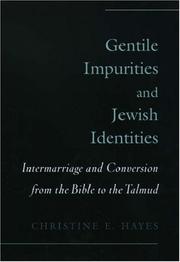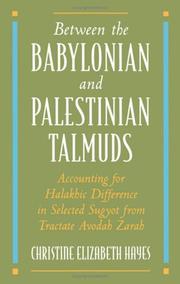| Listing 1 - 10 of 18 | << page >> |
Sort by
|
Multi
ISBN: 9789004515697 9789004515420 9004515429 9004515690 Year: 2022 Publisher: Leiden ;Boston Brill
Abstract | Keywords | Export | Availability | Bookmark
 Loading...
Loading...Choose an application
- Reference Manager
- EndNote
- RefWorks (Direct export to RefWorks)
"This volume presents the major works of classical rabbinic Judaism as inter-related aggregates analyzed through three central themes. Part 1, "Intertextuality," investigates the multi-directional relationships among and between rabbinic texts and nonrabbinic Jewish sources. Part 2, "East and West" explores the impact on rabbinic texts of the cultures of the Hellenistic, Roman, and Christian West and the Sasanian East. Part 3, "Halakha and Aggada," interrogates the relationship of law and narrative in rabbinic sources. This bold volume uncovers alliances and ruptures -- textual, cultural, and generic -- obscured by document-based approaches to rabbinic literature"--
Book
ISBN: 9781400866410 Year: 2015 Publisher: Princeton, NJ
Abstract | Keywords | Export | Availability | Bookmark
 Loading...
Loading...Choose an application
- Reference Manager
- EndNote
- RefWorks (Direct export to RefWorks)
Book
ISBN: 9781107644946 1107644941 9781107036154 1107036151 9781139565974 Year: 2017 Publisher: New York Cambridge University Press
Abstract | Keywords | Export | Availability | Bookmark
 Loading...
Loading...Choose an application
- Reference Manager
- EndNote
- RefWorks (Direct export to RefWorks)
The Cambridge Companion to Judaism and Law explores the Jewish conception of law as an essential component of the divine-human relationship from biblical to modern times, as well as resistance to this conceptualization. It also traces the political, social, intellectual, and cultural circumstances that spawned competing Jewish approaches to its own 'divine' law and the 'non-divine' law of others, including that of the modern, secular state of Israel. Part I focuses on the emergence and development of law as an essential element of religious expression in biblical Israel and classical Judaism through the medieval period. Part II considers the ramifications for the law arising from political emancipation and the invention of Judaism as a 'religion' in the modern period. Finally, Part III traces the historical and ideological processes leading to the current configuration of religion and state in modern Israel, analysing specific conflicts between religious law and state law.• In a single volume, this Companion addresses the nomian character of Judaism from biblical to modern times, spanning 2500 years • Contains a diverse set of chapters that combine conceptual analysis with historical analysis, making it appealing to both students and scholars studying the history of Jewish law or contemporary legal and political theory • Individual chapters explore different eras and topics in great depth, making this volume useful to students or scholars that are only focusing on one time period or concept
RELIGION / Judaism / General / bisacsh. --- Mishpat Ivri. --- Jewish law --- Jewish law. --- Judentum. --- Religiöses Recht. --- History. --- Law --- Judaism --- Jewish influences. --- Doctrines. --- Religion and law --- Mishpat Ivri --- Religion et droit --- Droit juif --- Droit --- Judaïsme --- Jewish influences --- Histoire --- Influence juive --- Doctrines --- Mishpat ivri. --- Religion / judaism / general / bisacsh. --- Religiöses recht. --- Judaïsme --- Jewish law - History. --- Law - Israel - Jewish influences. --- Judaism - Doctrines.
Book
ISBN: 9780691176253 9780691165196 069116519X Year: 2017 Publisher: Princeton Princeton University Press
Abstract | Keywords | Export | Availability | Bookmark
 Loading...
Loading...Choose an application
- Reference Manager
- EndNote
- RefWorks (Direct export to RefWorks)
In the thousand years before the rise of Islam, two radically diverse conceptions of what it means to say that a law is divine confronted one another with a force that reverberates to the present. What's Divine about Divine Law? untangles the classical and biblical roots of the Western idea of divine law and shows how early adherents to biblical tradition -- Hellenistic Jewish writers such as Philo, the community at Qumran, Paul, and the talmudic rabbis -- struggled to make sense of this conflicting legacy. Christine Hayes shows that for the ancient Greeks, divine law was divine by virtue of its inherent qualities of intrinsic rationality, truth, universality, and immutability, while for the biblical authors, divine law was divine because it was grounded in revelation with no presumption of rationality, conformity to truth, universality, or immutability. Hayes describes the collision of these opposing conceptions in the Hellenistic period, and details competing attempts to resolve the resulting cognitive dissonance. She shows how Second Temple and Hellenistic Jewish writers, from the author of 1 Enoch to Philo of Alexandria, were engaged in a common project of bridging the gulf between classical and biblical notions of divine law, while Paul, in his letters to the early Christian church, sought to widen it. Hayes then delves into the literature of classical rabbinic Judaism to reveal how the talmudic rabbis took a third and scandalous path, insisting on a construction of divine law intentionally at odds with the Greco-Roman and Pauline conceptions that would come to dominate the Christianized West. A stunning achievement in intellectual history, What's Divine about Divine Law? sheds critical light on an ancient debate that would shape foundational Western thought, and that continues to inform contemporary views about the nature and purpose of law and the nature and authority of Scripture.
Christian moral theology --- Bible --- Jewish religion --- Jewish theology --- Theology, Jewish --- Joodse ethiek: Halacha; Minhag (gewoonten); Tora --- Jewish law. --- Ius divinum. --- Halacha. --- Göttlichkeit. --- Judisk lag --- filosofi och teori. --- historia. --- 296*52 Joodse ethiek: Halacha; Minhag (gewoonten); Tora --- Filosofi och teori. --- Jewish law --- Judaism --- Religion and law. --- 296*52 --- Law --- Law and religion --- Philosophy. --- History --- Interpretation and construction. --- Doctrines. --- Religious aspects --- Recht. --- History. --- Historia. --- Religion and law --- Philosophy --- Interpretation and construction --- Doctrines

ISBN: 0195151208 019983427X 0198034466 1429403357 1280532394 9786610532391 Year: 2002 Publisher: New York, N.Y. Oxford University Press
Abstract | Keywords | Export | Availability | Bookmark
 Loading...
Loading...Choose an application
- Reference Manager
- EndNote
- RefWorks (Direct export to RefWorks)
Bible --- Jewish religion --- Sociology of religion --- Conversion --- Gentiles in rabbinical literature --- Gentiles in the Old Testament --- Interfaith marriage (Jewish law) --- Judaism --- Purity (Ethics) --- Purity, Ritual --- 296*52 --- Ceremonial purity --- Clean and unclean --- Cleanliness, Ritual --- Purity, Ceremonial --- Ritual purity --- Rites and ceremonies --- Hellenistic Judaism --- Judaism, Hellenistic --- Rabbinical literature --- Proselytes and proselyting, Jewish --- 296*52 Joodse ethiek: Halacha; Minhag (gewoonten); Tora --- Joodse ethiek: Halacha; Minhag (gewoonten); Tora --- Ethics --- Marriage, Mixed (Jewish law) --- Jewish law --- History --- Judaism&delete& --- History of doctrines

ISBN: 1280528249 0195356829 142940051X 9781429400510 9780195356823 9780195098846 0195098846 9781280528248 0195098846 0197738362 Year: 1997 Publisher: New York : Oxford University Press,
Abstract | Keywords | Export | Availability | Bookmark
 Loading...
Loading...Choose an application
- Reference Manager
- EndNote
- RefWorks (Direct export to RefWorks)
Hayes analyses selected divergences between parallel passages of the two Talmuds and debates whether external influences or internal factors best account for the differences between these two versions.
Rabbinical literature. --- Hebrew literature --- Jewish literature --- Talmud Yerushalmi. --- Talmud. --- Avodah zarah (Talmud) --- ʻAbodah zarah (Talmud) --- ʻAbodah zarah (Talmud Yerushalmi) --- Avodah zarah (Talmud Yerushalmi) --- Comparative studies.
Book
ISBN: 9780800697495 0800697499 Year: 2010 Publisher: Minneapolis: Fortress Press,
Abstract | Keywords | Export | Availability | Bookmark
 Loading...
Loading...Choose an application
- Reference Manager
- EndNote
- RefWorks (Direct export to RefWorks)
Book
Year: 2014 Publisher: [Liverpool] : Deborah Charles Publications ; Jewish Law Association,
Abstract | Keywords | Export | Availability | Bookmark
 Loading...
Loading...Choose an application
- Reference Manager
- EndNote
- RefWorks (Direct export to RefWorks)
Jewish law --- History.
Book
ISBN: 1283656558 0300188277 9781283656559 6613969052 9786613969057 9780300188271 9780300181791 0300181795 Year: 2012 Publisher: New Haven : Yale University Press,
Abstract | Keywords | Export | Availability | Bookmark
 Loading...
Loading...Choose an application
- Reference Manager
- EndNote
- RefWorks (Direct export to RefWorks)
"This book examines the small library of 24 books common to all Jewish and Christian Bibles--books that preserve the efforts of diverse writers over a span of many centuries to make sense of their personal experiences and those of their people, the ancient Israelites. Professor Christine Hayes guides her readers through the complexities of this polyphonous literature that has served as a foundational pillar of Western civilization, underscoring the variety and even disparities among the voices that speak in the biblical texts.Biblical authors wrote in many contexts and responded to a sweeping range of crises and questions concerning issues that were political, economic, historical, cultural, philosophical, religious, and moral. In probing chapters devoted to each of the 24 books of the Hebrew Bible, or Old Testament, Hayes reconstructs the meanings and messages of each book and encourages a deeper appreciation of the historical and cultural settings of ancient biblical literature"--
Book
Year: 2014 Publisher: [Liverpool] : Deborah Charles Publications ; Jewish Law Association,
Abstract | Keywords | Export | Availability | Bookmark
 Loading...
Loading...Choose an application
- Reference Manager
- EndNote
- RefWorks (Direct export to RefWorks)
Jewish law --- History.
| Listing 1 - 10 of 18 | << page >> |
Sort by
|

 Search
Search Feedback
Feedback About UniCat
About UniCat  Help
Help News
News